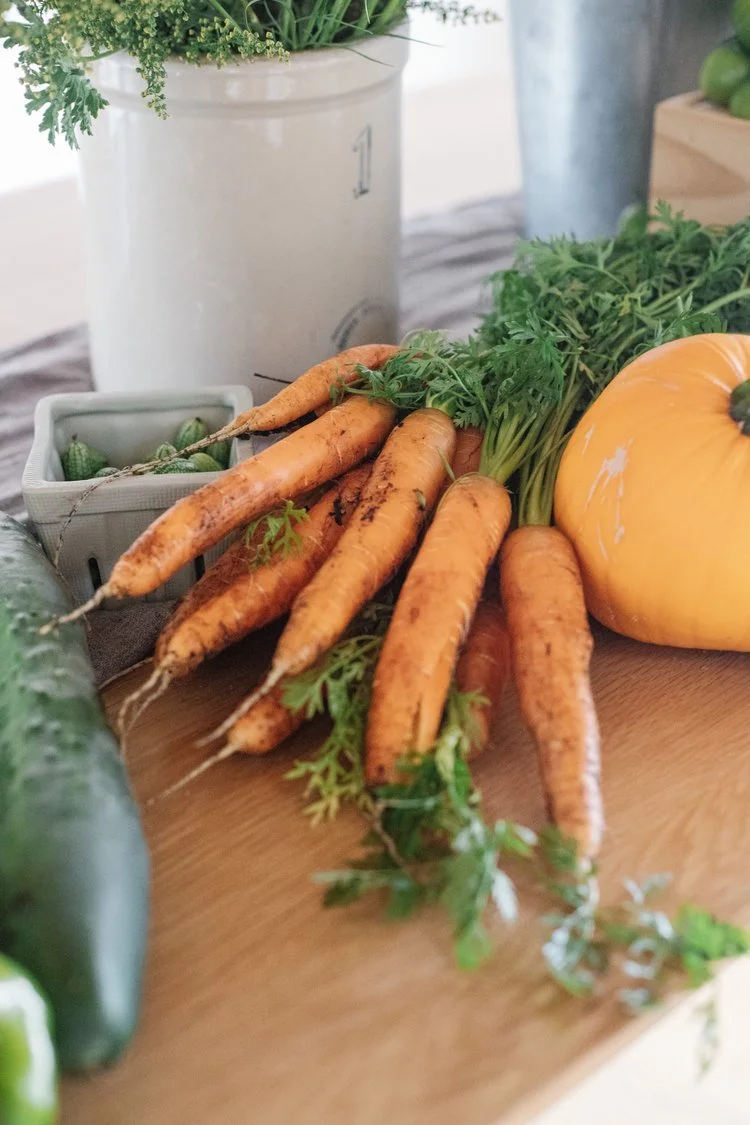How to Grow Carrots: A Beginner’s Guide
If you’re looking for a great beginner crop to grow in your garden, carrots are one of the most rewarding root vegetables to start with but they can be trickier to grow. Their crisp texture, sweet flavour, and wide selection of colours (including orange, purple, yellow, and white!), carrots are a favourite for kids and adults alike. In this simple guide, you will learn everything to help you grow beautiful, tasty carrots from seed to harvest!
Why Grow Carrots in Your Garden?
Carrots offer plenty of benefits in the garden and on your plate! To start, carrots are incredibly nutrient-rich crops. They are an excellent source of beta-carotene (which your body converts to vitamin A!), vitamin K, fibre, and antioxidants. As previously mentioned, they’re also well loved by kids! Their sweet flavour make them a garden snack children love to harvest and eat (I know mine do!).
Since carrots grow long and skinny underground you can grow what a bit in one area. You can grow them in deep containers, raised beds, or in-ground rows. As root crops, carrots also help break up compacted soil over time and encourage microbial activity!
When to Start Carrot Seeds
Carrots grow best in cool weather, making them ideal for spring and fall gardens but you can grow all year long! Depending on the time of the year you’re planting, follow these directions:
For Spring Planting: Direct sow your carrot seeds 2-4 weeks before your last expected frost date or once soil can be worked. Carrots can tolerate frosts and cool soil.
For Fall Planting: In many climates, especially zones 5-9, you can plant a second crop mid to late summer for a fall harvest. Sow seeds minimum 8-10 weeks before your first expected fall frost.
Tip: Unlike many other vegetables that you may grow in your garden, carrots do not transplant well, so always direct sow the seeds where you want them to grow!
How to Plant Carrot Seeds
Choose the Right Location: Carrots require full sun (6–8 hours daily) to grow, and like loose, well-draining soil free from rocks or heavy clay.
Prep Your Soil: Work your soil deeply (at least 10-12 inches), and remove any debris or clumps, and mix in compost rich soil.
Sow the Seeds:
Make shallow trenches that are about ¼ inch deep.
Space seeds about 1-2 inches apart or overseed like I do to ensure success. (You will thin them later!)
Cover lightly with fine soil and water.
Keep The Soil Moist: Carrots take around 1-3 weeks to germinate, so watering the top layer of soil regularly (2-3 times a day) to keep your seeds moist is crucial during the germination period. They prefer darker conditions so keeper it moist is beneficial.
Thin Seedlings: Once your carrot seedlings are about 2 inches tall, thin them to 2 inches apart so each carrot has plenty of space to grow. You will most likely thin again when they are 6-8 inches tall as we often miss one or two to thin.
Carrot Care Tips
Consistent Watering: Carrots need regular watering for them to grow straight and avoid cracking.
Weeding: Keep weeds at bay, especially early on, since they compete for nutrients and light. While your carrots are small seedlings, be gentle when weeding to avoid disturbing shallow carrot roots.
Mulching: A light mulch can help retain moisture and suppress weeds once the seedlings are established.
When to Harvest Carrots
Most carrot varieties mature in 70-100 days, but if you want smaller, baby carrots, you can harvest them earlier as well. Know the variety you planted for optimal harvest windows. When you’re ready to harvest, check the shoulder (the top of the carrot visible at the soil line). If it’s at least ½ to 1 inch wide, then your carrot is ready to harvest! Use a garden fork or gently loosen the soil to avoid breaking the roots as you pull them. Or push down an inch or so and pull up- it’s my fav trick!
Tip: As mentioned above, carrots can tolerate some frost, and a few chilly nights can actually sweeten their flavour! I love to harvest carrots after the first frost occurs in the fall.
Health Benefits of Carrots
Carrots are a nutritional powerhouse! They are rich in beta-carotene, which supports good vision, full of antioxidants and fibre to reduce inflammation and promote a healthy heart! They are also a great low calorie crop, great as a raw snack or added to meals for extra nutrients.
If you ask me, carrots are a must-grow for any gardener! With a little bit of patience, and a focus on soil prep, you’ll be rewarded with a colourful carrot harvest. Whether you enjoy them raw, roasted, or juiced, carrots bring flavour and nutrition straight from your garden to your plate. Don’t forget to try a few fun varieties like deep purple or rainbow carrot varieties!
* Note: Some links featured in the above post are commissionable/affiliate links.






